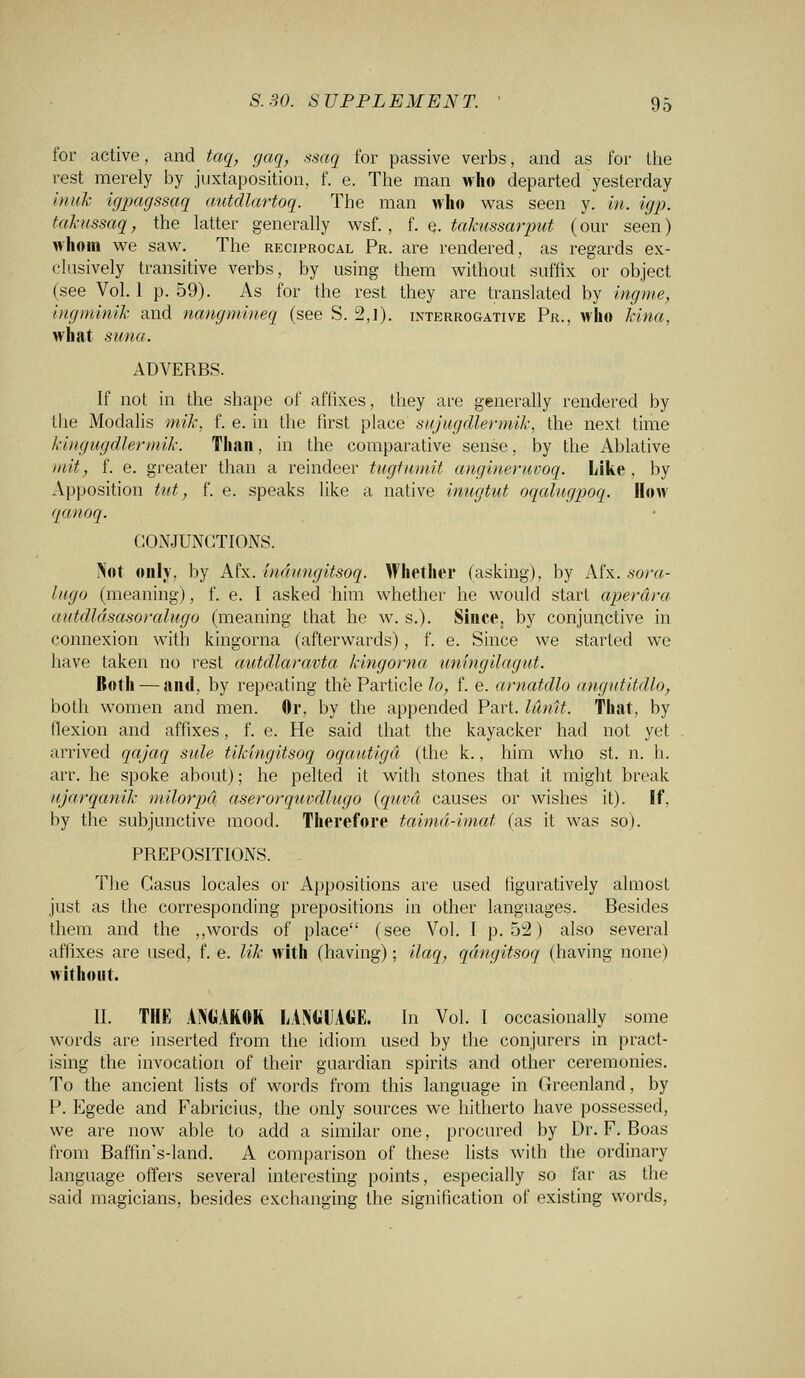
Full resolution (JPEG) - On this page / på denna sida - Comparative vocabulary - Special Part - 30) Supplement

<< prev. page << föreg. sida << >> nästa sida >> next page >>
Below is the raw OCR text
from the above scanned image.
Do you see an error? Proofread the page now!
Här nedan syns maskintolkade texten från faksimilbilden ovan.
Ser du något fel? Korrekturläs sidan nu!
This page has never been proofread. / Denna sida har aldrig korrekturlästs.
S. SO. s UP PL EM EN T.
95
for active, and taq, gaq, ssaq for passive verbs, and as for the
rest merely by juxtaposition, f. e. The man who departed yesterday
inuk igpagssaq autdlartoq. The man who was seen y. in. igp.
takussaq, the latter generally wsf., f. e. takussarput (our seen)
whom we saw. The reciprocal Pr. are rendered, as regards
exclusively transitive verbs, by using them without suffix or object
(see Vol. 1 p. 59). As for the rest they are translated by ingme,
ingminik and nangmineq (see S. 2,1). interrogative Pr., who Una,
what suna.
ADVERBS.
If not in the shape of affixes, they are generally rendered by
the Modalis mik, f. e. in the first place sujugdlermik, the next time
kingugdlermik. Than, in the comparative sense, by the Ablative
mit, f. e. greater than a reindeer tugtumit angineruvoq. Like . by
Apposition tut, f. e. speaks like a native inugtut oqalugpoq. How
qanoq.
CONJUNCTIONS.
>ot only, by Afx. indungitsoq. Whether (asking), by Afx.
sora-lugo (meaning), f. e. 1 asked him whether he would start aperara
autdldsasoralugo (meaning that he w. s.). Since, by conjunctive in
connexion with kingorna (afterwards), f. e. Since we started we
have taken no rest autdlaravta kingorna uningilagut.
Both — and, by repeating the Particle lo, f. e. arnatdlo angutitdlo,
both women and men. Or, by the appended Part. I unit. That, by
flexion and affixes, f. e. He said that the kayacker had not yet
arrived qajaq side tikingitsoq oqautigd (the k., him who st. n. h.
arr. he spoke about); he pelted it with stones that it might break
ujarqanik milorpd aserorquvdlugo (quvd causes or wishes it). If.
by the subjunctive mood. Therefore taimd-imat (as it was so).
PREPOSITIONS.
The Casus locales or Appositions are used figuratively almost
just as the corresponding prepositions in other languages. Besides
them and the „words of place" (see Vol. I p. 52) also several
affixes are used, f. e. lik with (having); ilaq, qdngitsoq (having none)
without.
II. THE ANGAKOR LANGUAGE. In Vol. I occasionally some
words are inserted from the idiom used by the conjurers in
practising the invocation of their guardian spirits and other ceremonies.
To the ancient lists of words from this language in Greenland, by
P. Egede and Fabricius, the only sources we hitherto have possessed,
we are now able to add a similar one, procured by Dr. F. Boas
from Baffin’s-land. A comparison of these lists with the ordinary
language offers several interesting points, especially so far as the
said magicians, besides exchanging the signification of existing words,
<< prev. page << föreg. sida << >> nästa sida >> next page >>